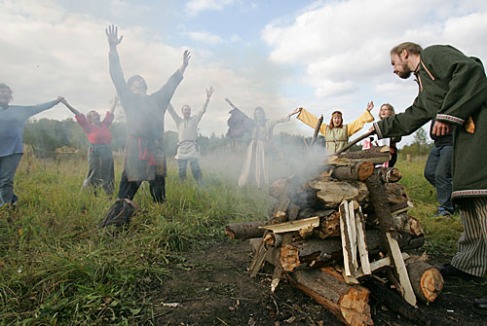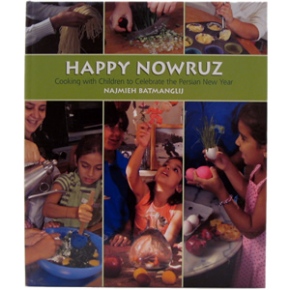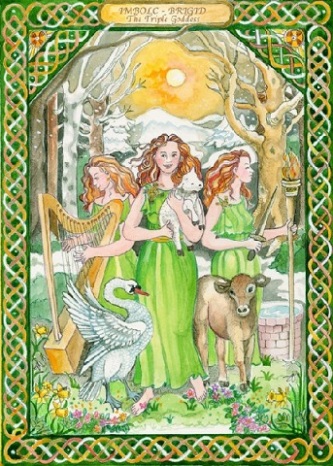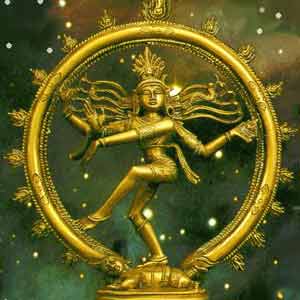When an article is rather lengthy, there is a tendency for people to skim and pick out bits and pieces out of context, and respond to what they think they just read, while missing the other points.
The previous post was in no way meant to insinuate that there are not many Spring festivals all around the world. There are! Many of them use some of the same imagery, eggs, rabbits, etc. It was not to imply that Germanic culture corners the market on that.
The point was to address the meme going around the internet that states incorrectly that the word Easter derives from Ishtar. So perhaps it’s my own error in not being more clear. (Incidentally, I am far from the only person taking issue with this meme, by all means read Megan McArdle’s article and the Belle Jar Blog).
The fact of the matter is, the word Easter derives from the Anglo-Saxon goddess Eostre. In Germany you will find Ostern, deriving from Ostara. Both were Spring Equinox festivals.
In old Celtic society you will find the Spring equinox festival Alban Eilir, celebrated by contemporary practitioners of Celtic Druidry and paganism today. According to the Order of Bards and Druids, eggs are also a traditional symbol of this holiday.
I recently responded to questions and comments on our Facebook page about why I’ve been mentioning Brigid in conjunction with Ostara, and had to clarify that while they are not connected linguistically, and while their holidays fell at different times of the year, Brigid’s holiday Imbolc (usually celebrated between Jan 30th to February 2nd) is also a heralding of Spring. Milk and dairy held significant meaning to the Celts who celebrated Imbolc, and symbolically they had a similar meaning as eggs do on Easter. The milk and eggs functioned in the same way, to stand for new life, rebirth, renewal, as well as nurturing sustenance.
CLEARLY this happened all over the world! Duh! The point is not that Germanic culture as the one and only culture with a claim on Spring! My point is just that all cultures deserve respect. Ishtar deserves respect within her cultural context.
People all around the world are attempting to reconnect with old ways that were often suppressed and hidden to history. It’s not just Germanic and Celtic descendants. There are Hellenic pagan groups in Greece, Italian-American Stregheria practitioners, revivers of the Old Religion in Italy, Slavic Rodnovery, Lithuanian Romuva, and even people attempting to revive Canaanite paganism and Egyptian Kemetic pagan religion. 
So for non-pagans to whom all of this “pagan jargen” is foreign, as well as to Wiccans and eclectics who haven’t been exposed to this other heritage influenced paganism, here’s a newsflash: it is NOT just the Germanic heritage that makes a connection between pagan religion and cultural heritage. It is happening all over the world with many cultural groups.
At Northern Grove, we support ALL of these people! And while we do support and would love to network with them, obviously every group has to have a focus, and ours is on the Northern European traditions. So our page attempts to explore and learn more about the Germanic, Celtic, Baltic, Slavic, Saami, Finn, and other groups in the region.
Anyway, the whole point about Ishtar and Easter was simply that Easter is an English word deriving from an Old English goddess. Ishtar is a Babylonian goddess, who likely had her own festival. I did Google it and couldn’t locate one, though. So by all means if someone knows it, link me to some info 🙂
I don’t put anybody’s culture above anybody else’s. But I hope as the Pagan movement grows, we can be respectful of ALL the cultures we’re representing.
Sure cultures overlap and have connections. People attempting to “school” me on this point have obviously not spent time on my Facebook Page, where I continuously butt heads with white supremacists (who turn up hoping we support that and get very angry when they discover we dont!) and I constantly point out that nobody’s ancestors lived in a vacuum. (Except perhaps those in harsh climates and remote islands, lol)
I have to roll my eyes at some of these comments, which yes, I am deleting. I stand up for respect of other cultures pretty much EVERY DAY. I continuously share articles with commentary about the way our ancestors interacted with other cultures, and explain that racial or cultural purity arguments are bogus.
But, there comes a point when the double standard has to be called out. Here I constantly say those things, but when I say “wait a minute, you’re taking an Old English word and attributing it to a Babylonian goddess, please respect my culture!” People try to turn it into some kind of racial purity thing. Ridiculous!
I’m also incredibly interested in Baltic paganism and Lithuanian Romuva and have discussed the connections and similarities between it and Hinduism. But look, there is an Indo-European background there. Not some long lost ancient connection from so many thousands of years ago that it barely makes sense to force a comparison.
I’m done with this rant, and hopefully now we can move on to more interesting topics!
~ Aelfwynne ~



Pingback: Cultural Appropriation, Ishtar, Eostre, and Easter | The Northern Grove
Just a note, where eggs are concerned, while modern chickens are cross bred to lay all year round, in the past, chickens, kept by many, for many a day, would have started laying around easter, another reason, I think eggs would have been celebrating. Easter chicks would have been common too, I think.
Bravo! That Ishtar post has been making me crazy for days, and while I love the beautiful diversity of pagan traditions, I also like well researched statements! Thank you!
Greetings –
Here is a thoughtful explanation from a religion scholar of how Ishtar relates to and inspires the Christian resurrection story (but not the eggs and hares and such associated with Easter). http://awaypoint.wordpress.com/2013/03/28/ancient-sumerian-origins-of-the-easter-story/
http://inanna.virtualave.net/ishtar.html#Relations
A) This is a nice little website built by someone, but it’s not something I would use as a reliable source. There are tons of nice little websites built by people who don’t know what they are talking about.
B) Still not seeing the connection to Ostara other than the false etymology based on “it sounds alike” which doesn’t really qualify as a true linguistic connection…
Eggs actually became associated with Easter because during Lent Christians traditionally did not eat any meat, eggs or dairy at all (Eastern Orthodox Christians still don’t). On Easter the Lenten fast is broken and people ate a lot of meat (Eastern Orthodox Christians still do this). When Protestants started dropping anything they couldn’t find in the Bible they started coming with explanations for things they did and didn’t know why anymore. Pretty much all of this “easter is pagan/ishtar” stuff goes back to Alexander Hislop, a prominent Protestant minister in Scotland.
I’m pretty sure Alban Eilir is a modern invention btw – “alban” means equinox/solstice (yep, both) in Welsh – not “light” – and eilir doesn’t really mean anything, in any case it definitely does not mean “Light of the Earth.” It sounds suspiciously like one of those things someone made up to sound more historical/legitimate/interesting (along the lines of the holiday Mabon, “Witta”, the Maiden/Mother/Crone thing, etc).
I have always wondered if Lent had another purpose besides religious. During “lambing season” it’s important to thicken the herds (with ALL animals, not just sheep), because the herds would have been culled before winter, and possibly lost even more if it was a bad winter. So by abstaining from meat for a bit in the Spring, you allow the herds to multiply again. If this is the case, it would have been done anyway, and religious significance was just ascribed to it to get everyone to go along with it in the Christian era.
The egg thing is common in many places at Springtime. A LOT of traditions are said to have started with Christian origins simply because the earlier history has been obscured and Christian writers are the earliest documentation we have.
As a great example of this read The Hidden History of Christmas Carols. It is mentioned within the article that it’s difficult to find the origins, many books claim Christmas carols have Christian origins… and it takes a lot of digging to discover they were alive and well far before Christianity… https://www.academia.edu/5121941/The_Hidden_History_of_Christmas_Carols_-_by_Carolyn_Emerick_-_for_Celtic_Guide_December_2013
ps – yes I keep meaning to update regarding Alban Eilir… this blog is a year old and was honestly written in a flurry, so wherever I got it from seemed legit in the moment. But others have mentioned that. It is VERY DIFFICULT to find legit info on a lot of Celtic pagan practice. There is more bull out there on Celtic history than anything else. It can be maddening 😉